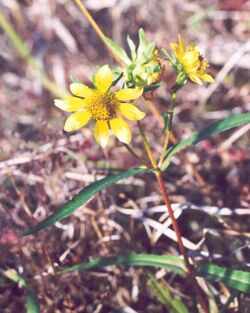Biology:Bidens laevis
| Bidens laevis | |
|---|---|

| |
| Scientific classification | |
| Kingdom: | Plantae |
| Clade: | Tracheophytes |
| Clade: | Angiosperms |
| Clade: | Eudicots |
| Clade: | Asterids |
| Order: | Asterales |
| Family: | Asteraceae |
| Genus: | Bidens |
| Species: | B. laevis
|
| Binomial name | |
| Bidens laevis | |
| Synonyms[2] | |
|
Synonymy
| |
Bidens laevis is a species of flowering plant in the daisy family known by the common names larger bur-marigold[3] and smooth beggarticks.[4] It is native to South America, Mexico, and the southern and eastern United States . It grows in wetlands, including estuaries and riverbanks.[5][6][7][8][9][10][11][12]
Bidens laevis is similar in appearance to its relative Bidens cernua and the two are sometimes confused. This is an annual or perennial herb growing over 20 centimeters tall and sometimes much taller, exceeding one meter in height and sometimes approaching two. The narrow lance-shaped leaves are 5 to 15 centimeters long, with finely toothed edges and pointed tips. The inflorescence bears one or more flower heads which bend down as they become heavy with fruit after flowering. Each head has a center of yellow disc florets and a fringe of 7 or 8 yellow ray florets each up to 3 centimeters long. The fruit is a dry achene with sharp barbs that adhere to fur and clothing, thus helping the plant with seed dispersal.[5]
References
- ↑ Greene Pittonia 4(24): 254 1901
- ↑ The Plant List, Bidens laevis (L.) "Britton, Sterns & Poggenb."
- ↑ (xls) BSBI List 2007, Botanical Society of Britain and Ireland, https://bsbi.org/download/3542/, retrieved 2014-10-17
- ↑ "Bidens laevis". Natural Resources Conservation Service PLANTS Database. USDA. https://plants.usda.gov/core/profile?symbol=BILA. Retrieved 9 January 2016.
- ↑ 5.0 5.1 Flora of North America, Bidens laevis (Linnaeus) Britton, Sterns & Poggenburg, Prelim. Cat. 29. 1888
- ↑ Biota of North America Program 2014 county distribution map
- ↑ Cabrera, A. L. 1978. Compositae. 10: 1–726. In A. L. Cabrera (ed.) Flora de la provincia de Jujuy. Instituto Nacional de Tecnología Agropecuaria, Buenos Aires
- ↑ Marticorena, C. & M. Quezada. 1985. Catálogo de la Flora Vascular de Chile. Gayana, Botánica 42: 1–157
- ↑ Brako, L. & J. L. Zarucchi. (eds.) 1993. Catalogue of the Flowering Plants and Gymnosperms of Peru. Monographs in Systematic Botany from the Missouri Botanical Garden 45: i–xl, 1–1286
- ↑ Breedlove, D.E. 1986. Flora de Chiapas. Listados Florísticos de México 4: i–v, 1–246
- ↑ Neill, D. A. & C. Ulloa Ulloa. 2011. Adiciones a la Flora del Ecuador: Segundo Suplemento, 2005-2010 1–202. Fundación Jatun Sacha, Quito
- ↑ Zuloaga, F. O., O. Morrone, M. J. Belgrano, C. Marticorena & E. Marchesi. (eds.) 2008. Catálogo de las plantas vasculares del Cono Sur. Monographs in Systematic Botany from the Missouri Botanical Garden 107(1–3): i–xcvi, 1–3348.
External links
- Jepson Manual Treatment
- Calphotos Photo gallery, University of California
- Go Botany, New England Wildflower Society, Bidens laevis (L.) B.S.P. , smooth beggar-ticks
- Atlas of Florida Vascular Plants
- Santa Monica Mountains National Recreation Area photos, United States Department of the Interior, National Park Service
- Illinois Wildflowers
- El Estanque, fichas de plantas, Bidens laevis (Amor seco acuático) photo by Pablo J. Saubot
Wikidata ☰ Q2901718 entry
 |

